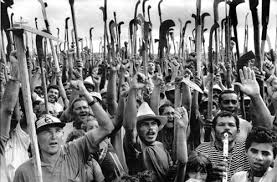I attended the New England Anarchist Bookfair this past weekend in Boston and what I saw of it was inspiring. The best t-shirt for sale: "Don't rock the boat. Sink the fucker."
In an unrelated note, I was scanning the shelves at my local library and came across a book entitled "Leadership Secrets of Attila the Hun" - no lie. The dust jacket made it plain that the book was written for business leaders and featured praise from Ross Perot, William Coors, the vice pres of GM, and the president of American Airlines. It was published in, you guessed it, the 1980s. You just can't make this stuff up.
Some of the news and analysis of note we've come across in the past week:
Kevin Mattson,
"What The Jungle Tells Us Today," CommonDreams.org, April 19, 2006
What’s surprising is how upset Sinclair was with the limited nature of reform The Jungle helped win. Sinclair was a socialist and an admirer of the municipal slaughterhouse system that had grown up in Europe. He grew so disgruntled with the shortcomings of Roosevelt’s support for federal oversight (Sinclair worried about bribery of inspectors, among other things) that he seemed to give up on reform for a period of time and turned instead to exploring numerous dietary fads – including fasting and an array of vegetarian regiments (one he learned at the Kellogg Sanitarium) and even an odd beefsteak diet.
It’s this detail that troubles me. Because I realize that Sinclair’s hibernation from politics and his search for "perfect health," as he called it, symbolized a broader change in American history. Today, Sinclair’s experimentation in lifestyle change has replaced the more public solutions captured in the Meat Inspection Act and Sinclair’s dream for socialized slaughterhouses. This displacement suggests a wider transformation in the American conscience. We seem to have a hard time talking about public solutions for the many problems we face.
Ken Silverstein,
"Our Friend Teodoro," Harper's Magazine, April 19, 2006
An article on the cozy relationship of the Bush Administration with the dictator of the oil exporting Equatorial Guinea.
"Thank you very much for your presence here," Secretary of State Condoleezza Rice said to Obiang at a press conference last week. "You are a good friend and we welcome you." Rice didn't mention that her own department's 2006 human rights report on Equatorial Guinea, released 35 days before the press conference, laid out a laundry list of abuses that included torture, arbitrary arrest, judicial corruption, child labor, forced labor, and "severe restrictions" on freedoms of speech and press.
I happened to read the Mother Jones article on Obiang when it came out over a year ago and it's worth reading and is
available online surprisingly enough (
backup link).
Scott Shane,
"National Archives Pact Let C.I.A. Withdraw Public Documents," New York Times, April 18, 2006"
In the latest example of the Bush Administration's exceptional mania for government secrecy, it has come to light that two government agencies with much to hide have been reclassifying huge numbers of government documents that were previously available to researchers.
The National Archives signed a secret agreement in 2001 with the Central Intelligence Agency permitting the spy agency to withdraw from public access records it considered to have been improperly declassified, the head of the archives, Allen Weinstein, disclosed on Monday.
The revelation drew a comparison with "a similar 2002 agreement with the Air Force that was made public last week."
"Thomas S. Blanton, director of the private National Security Archive at George Washington University," stated that "The National Archives aided and abetted a covert operation to lie to researchers and white-out history." The article reports that since 1999 more than 55,000 pages of historical documents (dating as far back as the 1950s) have been removed from accessibility at the archives. It appears the CIA and Air Force made the agreements with an assistant archivist at the Archives without the knowledge of the directors of the Archives - an underhanded tactic in a thoroughly underhanded agreement.
"Study: Health Insurers Are Near-Monopolies," Associated Press, April 18, 2006
"Consolidation among health insurers is creating near-monopolies in virtually all reaches of the United States," according to a recent study by the American Medical Association (in the words of the article). The study shows "that in each of 43 states, a handful of top insurers have gained such a stronghold that their markets are considered "highly concentrated" under U.S. Department of Justice guidelines, often far exceeding the thresholds that trigger antitrust concerns."
"The AMA says there have been more than 400 mergers among health-care insurers in the past decade. As they've consolidated and presumably eliminated duplicative functions, they're not passing the savings in personnel and administrative costs on to consumers. Rate increases, though slowing, are higher than ever and growing at a near double-digit pace."
"The AMA says it has taken up this antitrust issue with the Department of Justice, but says it has run into roadblocks with regulators. AMA officials say regulators seem uninterested, even though government officials are more than willing to target doctors' groups and hospitals on antitrust matters."
Stephen R. Shalom,
"In Search of Economic Justice: A Review Essay," New Politics, April 19, 2006
One problem with many of the existing sects is that they employ "democratic centralism," a principle that says once the party or organization has reached a democratic decision, all members are bound to accept and follow it. In practice, in many such organizations the decisions are not reached democratically, but even when they are, democratic centralism will often be experienced negatively by those who are not members of the party or organization. It is extremely alienating to have a discussion with someone only to discover that no matter how persuasive your arguments, no matter how much effort you make to find some middle ground, your interlocutor is bound by democratic centralism to maintaining the party line.
I would only add that members are bound to not only accept but also to promote to non-members the line decided upon by the group. So no matter what one's personal opinions are, the member is supposed to publicly favor the decision taken by the group as a whole. The potentially alienating and demoralising impact of such a policy on the membership should be obvious.



